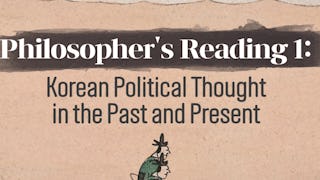In the “Exploration to Korean Philosophy” series, we will delve deeper into the subject matter than what was previously addressed in the courses “Introduction to Korean Philosophy and Culture (IKPC)” and “In Search for the Origins of Korean Philosophy (SOKP).”


EKP2: Formation of Korean Neo-Confucianism
This course is part of Korean Philosophy Essentials Specialization

Instructor: SO JEONG PARK
Included with
What you'll learn
Examine the Confucian-Buddhist debate during the Joseon dynasty, emphasizing the rise of Neo-Confucianism over Buddhism and Daoism
Understand the use of diagrams in Neo-Confucianism and their role in Korean philosophy
Explore the connection between the heart-mind and Heaven in Korean philosophy
Explore the famous Four-Seven debate, delving into the distinctions between the four moral emotions and seven everyday feelings
Skills you'll gain
Details to know

Add to your LinkedIn profile
See how employees at top companies are mastering in-demand skills

Build your subject-matter expertise
- Learn new concepts from industry experts
- Gain a foundational understanding of a subject or tool
- Develop job-relevant skills with hands-on projects
- Earn a shareable career certificate

There are 4 modules in this course
This week, we focus on the Confucian-Buddhist debate during the Joseon dynasty, emphasizing the rise of Neo-Confucianism over Buddhism and Daoism. We will learn about Neo-Confucian critiques against Buddhism and reflect on the role of argumentation in Korean philosophy and society. The lessons also cover the transition from syncretism to orthodoxy and highlight key historical figures. In later lessons, we will explore Sambong's critiques of Buddhism and delve into the Confucian-Buddhist debates between Sambong and Gihwa, considering their impact on modern Korean philosophy and social harmony.
What's included
9 videos2 readings1 assignment1 discussion prompt
This week, we will focus on the use of diagrams in Neo-Confucianism and their role in Korean philosophy. We will learn about the emergence of these diagrams, their significance, and specific diagrams related to human relations with Heaven and Earth. The lessons also cover the Korean philosophical diagram, Doseol, which represents human existence and life in Joseon Korea. Lastly, we will explore the early development of Doseol and its role in domesticating Neo-Confucianism in Korea.
What's included
5 videos1 reading1 assignment1 discussion prompt
In this week, we will explore the connection between the heart-mind and Heaven in Korean philosophy. We will gain an understanding of the Korean concept of Maum (heart-mind), its role in reaching Heaven, and its connection with Heaven and humans. The lessons also delve into the historical significance of Cheonmyeong-do and the centuries-long debate it sparked in Korea.
What's included
11 videos1 reading1 assignment1 discussion prompt
In this week, we will explore the famous Four-Seven debate, delving into the distinctions between the four moral emotions and seven everyday feelings. We will analyze whether Korean Neo-Confucianism is synonymous with Korean philosophy and understand these concepts through the Li-Qi metaphysical framework. The lessons also revisit the Four-Seven debate, examining the role of Libal and the emphasis on seven feelings in Korean Neo-Confucianism.
What's included
8 videos1 reading2 assignments1 peer review1 discussion prompt
Earn a career certificate
Add this credential to your LinkedIn profile, resume, or CV. Share it on social media and in your performance review.
Instructor

Offered by
Explore more from Philosophy
 Status: Free Trial
Status: Free TrialSungkyunkwan University
 Status: Free Trial
Status: Free TrialSungkyunkwan University
 Status: Preview
Status: PreviewSungkyunkwan University
 Status: Free Trial
Status: Free TrialSungkyunkwan University
Why people choose Coursera for their career





Open new doors with Coursera Plus
Unlimited access to 10,000+ world-class courses, hands-on projects, and job-ready certificate programs - all included in your subscription
Advance your career with an online degree
Earn a degree from world-class universities - 100% online
Join over 3,400 global companies that choose Coursera for Business
Upskill your employees to excel in the digital economy
Frequently asked questions
To access the course materials, assignments and to earn a Certificate, you will need to purchase the Certificate experience when you enroll in a course. You can try a Free Trial instead, or apply for Financial Aid. The course may offer 'Full Course, No Certificate' instead. This option lets you see all course materials, submit required assessments, and get a final grade. This also means that you will not be able to purchase a Certificate experience.
When you enroll in the course, you get access to all of the courses in the Specialization, and you earn a certificate when you complete the work. Your electronic Certificate will be added to your Accomplishments page - from there, you can print your Certificate or add it to your LinkedIn profile.
Yes. In select learning programs, you can apply for financial aid or a scholarship if you can’t afford the enrollment fee. If fin aid or scholarship is available for your learning program selection, you’ll find a link to apply on the description page.
More questions
Financial aid available,
¹ Some assignments in this course are AI-graded. For these assignments, your data will be used in accordance with Coursera's Privacy Notice.

